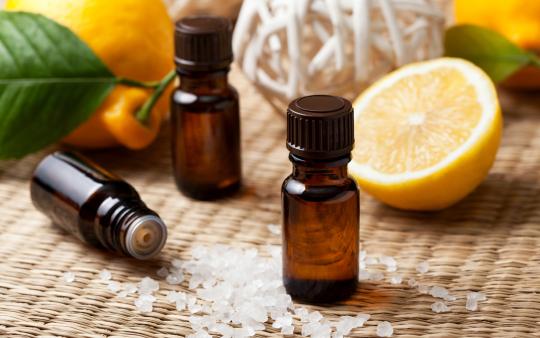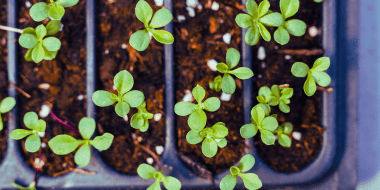Chances are, even if you don’t use essential oils yourself, you know someone who does. Essential oils have skyrocketed in popularity over the past couple of years. They’re in natural products as fragrance and performance boosters, and may be used as part of alternative therapies for everything from stress to sleep issues to immune boosting.
Jessica Raymond is trained in the use of essential oils and has been using them in her home for years. She has conducted in-depth research about the safety and use of essential oils in the home, so I caught up with her to learn more. Let's hear what she had to share!
Let's start with the basics. What are essential oils?
Essential oils are naturally occurring aromatic compounds found in plants. In addition to giving plants distinctive smells, essential oils help protect them against fungus, diseases, and predators.
How can essential oils be used around the home?
Essential oils are wonderful to use around the home for cleaning, refreshing, and on a health level as well. They are a great alternative to synthetic chemicals often found in conventional products.
Lemon essential oil is wonderful at degreasing, and orange essential oil is great for sticky messes. Adding high quality oils to natural cleaners, such as homemade products using vinegar and baking soda, can boost the overall cleaning power.
There are also great examples of essential oils that can help fight germs, such as clove and oregano (not to be confused with oil of oregano), and fungus, like tea tree.
Finally, they can be used to create natural air fresheners so you can get the scent you want without the harmful chemicals in conventional air fresheners.
It should be noted that not all essential oils are created equal. Look for a pure, high quality brand to get the best performance. If you’re simply looking for a nice smell, still look for 100% pure products, but the quality isn’t as important.
Why are they better alternatives to synthetic chemicals?
Synthetic chemicals found in common household products are known to cause allergies and can contribute to free radicals overload, which causes a host of issues within our bodies.
We often learn about the problems associated with these chemicals only after they’ve been introduced to the market for long enough to see harm. For example, antibacterial products containing Triclosan are banned in Europe and will be banned in the US next year. It has been proven to cause harm to the environment and people as a hormone disruptor, but is still allowed in Canadian products.
Essential oils have a long history of use, and when used properly and safely, can actually be beneficial to your health.
What should we know before using them in our homes?
I am a big advocate of using essential oils safely. There are lots of recipes and pieces of advice on the internet surrounding essential oils – make sure you trust your source. Here are my main pieces of advice before you get started:
Always follow the directions on the label. For example, if a product says do not ingest–DON’T EAT IT! No matter what you see on the internet, always follow the instructions on the specific product.
Always dilute the essential oil with a carrier oil, there are many you can use each with their own benefits. In a pinch, you can even use olive oil from your kitchen. If you are using a high quality oil you only need 1 or 2 drops; more does not mean better.
Do not put essential oils directly in a bath! You can add them to Epsom salts, or better yet along with a carrier oil, Epsom salt, and castile soap.
It’s also important that you use certain oils with caution or not at all if you are pregnant or nursing. If using them on children, seniors, or pets always dilute essential oils – even those that are known for being mild on skin.
Finally, you should be aware that there are no labelling laws for essential oils. Before choosing a brand, consider asking for 3rd party testing reports to ensure the oils are of a high quality and not containing the synthetic chemicals you’re trying to avoid in the first place.
If we started using just one EO around the home, what should it be?
That is a hard question as it really depends on what you want to use an essential oil for. If for cleaning I would say a citrus such as lemon, orange, or lime or a protective blend. Those are great beginner oils as you can add them to any cleaning product you make.
Jessica teaches all about essential oils at private and public functions. She is a Wellness Advocate with DoTerra, and loves helping people find and bring back their own power for their health and wellness. You can find more recipes and essential oil tips at www.motherofrays.com.
*Originally published November 9, 2016









